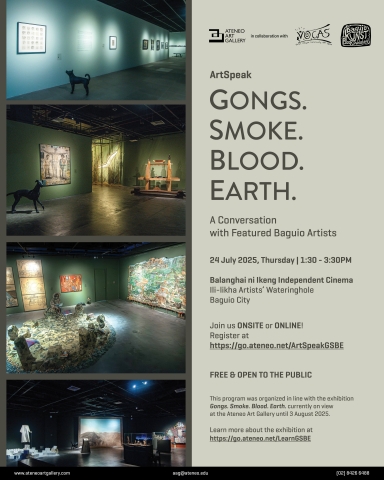Serapio bilang Pasyon: Alay at Panata ng Dulaang Sibol sa Semana Santa
14 Apr 2025 | Ali Figueroa
Ngayong Miyerkules Santo, 16 Abril 2025, ika-3 ng hapon, sa Tanghalang Pagsanghan (Dulaang Sibol), sa Mataas na Paaralang Ateneo de Manila, inihahandog ng Dulaang Sibol ang espesyal na pagtatanghal ng Ang Paglilitis ni Mang Serapio ni Paul Dumol. Alay at panata namin ang Serapio, at higit limang dekada na itong itinatanghal ng Sibol na kawangis ng pasyon ni Hesus. Libre at bukas ito sa buong komunidad, at inaanyayahang lahat na makiisa sa pagsaksi, panalangin, at pagninilay.
Written in 1968 and first staged by Dulaang Sibol, where it won first place in the second Paligsahang Pandulaan, Ang Paglilitis ni Mang Serapio has become a cornerstone of Filipino theater, and remains one of the most frequently staged and read works by a Filipino playwright.
The play offers a searing mirror—sadly still relevant—to the country’s political and economic landscape, where injustice is institutional, kindness is punished, and the machinery of blame continues to grind down the most vulnerable. More than five decades since it was first staged, Serapio still asks the same devastating question: What kind of society do we allow to exist? The answer, Sibol insists, must be examined again and again—especially in seasons of silence, sacrifice, and truth.
Sibol’s staging, devised in the early 1970s by Dr Onofre Pagsanghan (Mr Pagsi), casts Serapio unmistakably as a Christ figure—condemned, humiliated, and ultimately sacrificed. In Sibol’s hands, the play has never remained simply social commentary or an artifact of 1960s drama. Over the decades, it has grown into Sibol’s very own Passion play.
Following a post-pandemic revival—including a deeply moving Holy Wednesday recollection performance for Ateneo employees in 2023 and a restaging in a Paul Dumol anthology in 2024—this 2025 performance hopes to bring Serapio fully into Sibol’s annual Lenten rhythm.
This week's staging is created entirely from existing items—reused costumes, repurposed set pieces, and shared memory. What remains of the spectacle is intentional: stripped down and laid bare. It is essential. It is human. It is theater as conscience, as reflection, and as prayer.
The performance is free and open to all. Contributions to support Dulaang Sibol’s theater-home and ongoing projects are most welcome.








